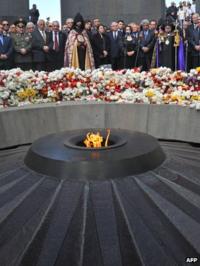 Today
marks the 100th anniversary of the massacre of hundreds of thousands of
Armenians by Turks, as the Ottoman Empire entered its death throes. There are a number of articles and programs about the event, but here are a handful of books that give a wider context to what happened.
Today
marks the 100th anniversary of the massacre of hundreds of thousands of
Armenians by Turks, as the Ottoman Empire entered its death throes. There are a number of articles and programs about the event, but here are a handful of books that give a wider context to what happened.1. The Ottoman Empire began in the heyday of the Mongols: its dates are usually given as 1299-1923. To understand who the Mongols are, read Jack Weatherford's excellent Genghis Khan and the Making of the Modern World. The great Khan was a Mongol chieftain who believed that he and his people were chosen by heaven--The Great Blue Sky--to conquer the world. By the end of his lifetime he and his four sons held sway over the greatest empire the world knew until the Britania ruled the waves 400 years later. They and their mounted followers went as far as the grasslands of Eurasia extended. Only the forests of Europe and the heat and humidity of southern India and Southeast Asia--both unwelcoming to mounted warriors--limited their advance.
Cruel in the extreme to those who refused to surrender, they searched talent wherever they went, and, Weatherford writes, produced a body of law that was relatively egalitarian and allowed considerable religious freedom.
2. Ali and Nino by Kurban Said. The Romeo and Juliet lovers of this novel set in Azerbaijan are Georgian and Muslim, but the uneasy relation between Armenians and their neighbors is in the background.
3. The Goodtime Girl by Tess Fragoulis. The Armenians were not the only victims of Turkish agression in the early 20th century: the Greeks of Anatolia also were chased and killed. In this novel, the main character is a young woman who was her father's darling in the early 1920s in Smyrna. When Greeks were driven from the city by Turks in 1922, she escaped to Pireaus and Athens where she ended up singing other people's songs of distress and love.
The worst of the story happens off stage. Kivelli has wiped part of it from her mind. It resurfaces in her dreams and in an abbreviated version told about half way through the book. But we know always that a number of people were beastly to a number of others for reasons which in no way justify what happened.
Kivelli is a survivor, and sings her sorrows so movingly that she is able to escape. That she sings the songs of other people is also poignant, because Fragoulis makes it clear that while many people may have stories to tell, not all of them have the voice to tell them.


















No comments:
Post a Comment